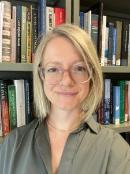Dr Jennifer Keating, Associate Professor in the UCD School of History, has been awarded ERC funding of €1.5 million for a major study entitled 'Land Limits: Towards a connected history of population, environmental change, capital and conflict in Russian Eurasia, 1860s-1920s'.
 Using five central case studies situated across the vast territory of the former Russian empire, Land Limits aims to understand the ecological impact of population increase, and to critically assess the economic and political implications of shifting land use practices. It explores both intellectual and material dimensions of the relationship between population growth and anthropogenic environmental change, focusing on the diversification of repertoires of land use including deforestation, mining, intensified farming practices, enclosure and irrigation. As populations grew as a result of natural increase, migration and displacement in the second half of the nineteenth century and the first third of the twentieth century, these new and/or intensified patterns of land use became both the motor of economic growth via local and regional networks of labour and capital, and the driver of various types of conflict as land and resources became at times limited, contested and politicised. The project seeks to redefine scholarly debates on the nature of economic development in northern Eurasia, and on state and community violence of various types in the late imperial/early Soviet period (1860s-1920s), by restoring the environment asavital category in exposing the complex causalities that led to the collapse of the imperial state and the rise of its successors.
Using five central case studies situated across the vast territory of the former Russian empire, Land Limits aims to understand the ecological impact of population increase, and to critically assess the economic and political implications of shifting land use practices. It explores both intellectual and material dimensions of the relationship between population growth and anthropogenic environmental change, focusing on the diversification of repertoires of land use including deforestation, mining, intensified farming practices, enclosure and irrigation. As populations grew as a result of natural increase, migration and displacement in the second half of the nineteenth century and the first third of the twentieth century, these new and/or intensified patterns of land use became both the motor of economic growth via local and regional networks of labour and capital, and the driver of various types of conflict as land and resources became at times limited, contested and politicised. The project seeks to redefine scholarly debates on the nature of economic development in northern Eurasia, and on state and community violence of various types in the late imperial/early Soviet period (1860s-1920s), by restoring the environment asavital category in exposing the complex causalities that led to the collapse of the imperial state and the rise of its successors.
 cropped 3-400x254.jpg) Dr Keating said 'The ERC grant is a fantastic opportunity that will allow a multi-lingual team to explore a set of highly diverse environments and communities that in the late nineteenth century formed part of the territory of the Russian empire. Together we will think critically about questions of scale and connection in the study of the past, working from small-scale highly localised case studies to macro frames of analysis that are regional, imperial and at times global. Conducted across five present-day nation states, this work makes a clear case for the importance of ecological literacy when thinking about the past and the present. It promises to revolutionise our understanding of the connections between environmental change, economic growth and political violence in Eurasia, and contributes directly to much broader conversations about the breakdown of states and the birth of new political entities. I am extremely grateful to theERC, and to colleagues within the School of History and UCD Research for their support, in particular the wonderful Máire Coyle.'
Dr Keating said 'The ERC grant is a fantastic opportunity that will allow a multi-lingual team to explore a set of highly diverse environments and communities that in the late nineteenth century formed part of the territory of the Russian empire. Together we will think critically about questions of scale and connection in the study of the past, working from small-scale highly localised case studies to macro frames of analysis that are regional, imperial and at times global. Conducted across five present-day nation states, this work makes a clear case for the importance of ecological literacy when thinking about the past and the present. It promises to revolutionise our understanding of the connections between environmental change, economic growth and political violence in Eurasia, and contributes directly to much broader conversations about the breakdown of states and the birth of new political entities. I am extremely grateful to theERC, and to colleagues within the School of History and UCD Research for their support, in particular the wonderful Máire Coyle.'
Also successful in this round of ERC Starter Grants was (opens in a new window)Dr Fiona Freeman of the UCD School of Mechanical and Materials Engineering, with her project META-CHIP.
This ERC Starting Grants competition attracted over 2,696 proposals, which were reviewed by panels of renowned researchers from around the world. Successful applicants of this call will carry out their projects at universities and research centres in 24 countries in Europe. The grants are expected to create more than 2,600 jobs for postdoctoral fellows, PhD students and other staff at the host institutions. Read more about (opens in a new window)ERC grants here.